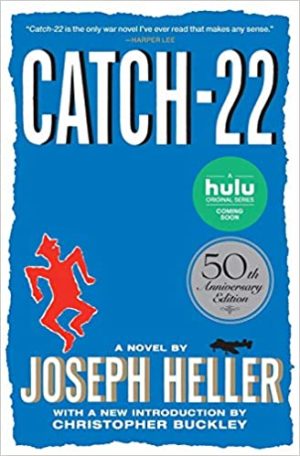In Catch-22 by Joseph Heller, we find ourselves in the presence of Yossarian, a quizzical and virile man who is serving as a bombardier in the American army, with a tenacious animosity towards flying more missions. Under the command of Colonel Carthart, we are introduced to the amphora of the novel: Catch-22. The single way to be discharged from service in the army is through insanity, though to admit that you are insane shows signs of sanity. Hence, no one will ever be sent home. Overtly or discretely, you can be sure that Catch-22 is haunting you at every turn.
“There was only one catch and that was Catch-22, which specified that a concern for one’s own safety in the face of dangers that were real and immediate was the process of a rational mind. Orr was crazy and could be grounded. All he had to do was ask; and as soon as he did, he would no longer be crazy and would have to fly more missions. Orr would be crazy to fly more missions and sane if he didn’t but if he was sane he had to fly them. If he flew them he was crazy and didn’t have to; but if he didn’t want to he was sane and had to.”
Tragically hilarious; fantastically nonsensical. Already, the paradoxical gist of Joseph Heller’s Catch-22 should be making itself apparent. My first tendency upon picking up a book is to look at the quotes scribed upon the front or back page. The one that caught my eye was “Catch-22 is the only war novel I have ever read that makes any sense”, written by Harper Lee.
Reading this novel was a similar experience to finding my way through a labyrinth; one with surprises at every corner. I used this Harper Lee quote as my form of navigation, and, by the end of the novel – the end of the labyrinth – my prize was deducing the reasoning behind the quote.
We are invited to the passenger’s seat of Yossarian’s aircraft, rendering this novel one rollercoaster. The epicentre of Yossarian’s aversion to war lies in the death of another soldier, Snowden, in his arms on a flight. This reinforces the idea that war sees no bounds between land and sky. The delicate beauty to Heller’s writing, which we are free to bask in, allows us to subconsciously appreciate the political context of it.
The author splits this grand novel into short stories of sorts and deftly adapts the style of writing for each character. However, they all maintain a common theme: a darting narrative which demonstrates the characters’ futile attempts to unravel the incessant mental debate caused by Catch-22, together with the encompassing stress of war.
Having flown sixty missions himself, the author captures his experience through the acerbity of his language, his mastery for literature and a lovely languor. Heller holds us in a suspension between comedy and war, providing fleeting escapisms which render the return to reality all the more gripping.
It is in the humour that the tragedy is found. This outrageously antagonistic novel provides a narrative which rarely occurs in a war book: one which highlights the ridiculousness of war. Joseph Heller’s nonsensical writing makes perfect sense in the fact that he is trying to communicate the lack of sense in the motivation behind war, meaning the style of writing is entirely appropriate in relaying the message of the novel. Now that, that is quite some catch!
Catch-22 by Joseph Heller is published by Vintage Classics, 544 pages.





